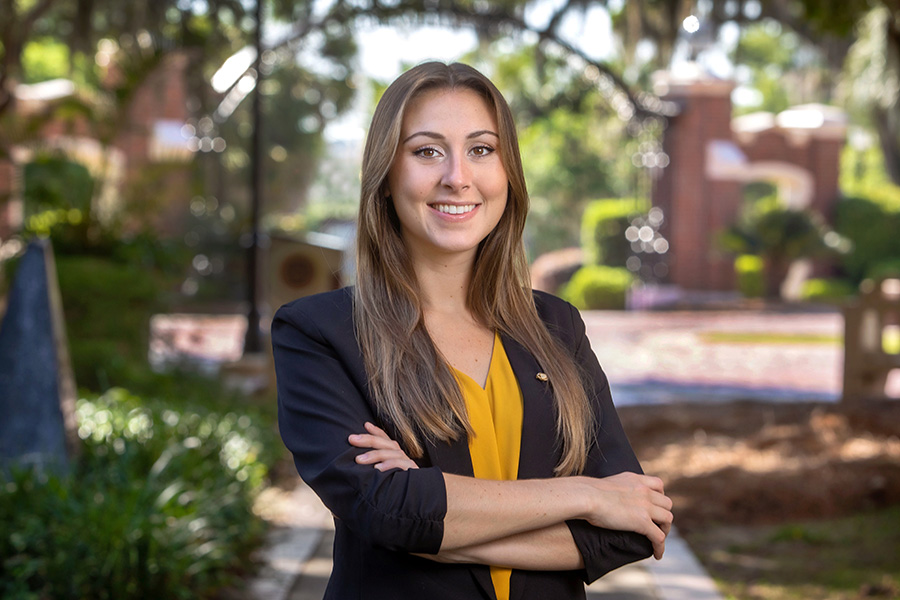
“As soon as I stepped onto the Florida State University campus and saw the brick buildings, live oaks and Spanish moss, I knew it was a perfect fit.”
Fast Facts
- Favorite Hobby: Scuba (158 logged dives)
- FSU Hidden Space: FSU Memorial Garden
- Exciting Destinations: has traveled to 25 countries
- FSU Zen: FSU REZ Lakefront Park, Calvin’s Coffee House
- FSU Food: Lava brownie at Suwannee Room
In her junior year of high school, music therapy senior Kayla Duncan researched potential majors, hoping to find an option that combined her love of music with her interests in psychology. She saw the Florida State University Music Therapy Program as an opportunity to learn from some of the field’s most influential professionals.
“As soon as I stepped onto the Florida State University campus and saw the brick buildings, live oaks and Spanish moss, I knew it was a perfect fit,” she said.
Once at FSU, Duncan experienced multiple challenges as an out-of-state student. This prompted her to connect with other students and eventually offer guidance and advice through the Florida State University Off-Campus Out-of-State Ambassadors (OCOOSA) program. For two semesters, she participated as a team lead for OCOOSA, for which she worked with graduate students on a model program to foster connections and facilitate community among primarily first-year students living off-campus or coming to FSU from another state.
Through her coursework as a Music Therapy major, Duncan worked with various populations in clinical settings, including patients at Tallahassee Memorial HealthCare; older adults at Elder Day Stay; students at The Magnolia School and FAMU DRS; inmates with neurological disabilities and psychiatric comorbidities at the Wakulla Correctional Institution Annex; and clients with varying psychiatric needs at TMH Behavioral Health Center.
In July, Duncan will intern at the Chattahoochee-based Florida State Hospital, a state mental health facility that serves civic and forensic populations. She plans to earn a master’s degree in counseling and a doctorate in clinical psychology.
What drew you to the FSU music therapy program?
During my research, I came across the field of music therapy, an evidence-based health profession that uses music to treat non-musical goals. It just so happened that the Florida State University College of Music has one of the top music therapy programs in the country, led by the field’s preeminent scholars and professionals who have conducted vital research that shapes how music therapists practice every day.
Music therapy is one of the only professions where one can work with all ages and abilities to treat non-musical goals with music in a safe environment and in a non-invasive way. By working with professional teams, music therapists can achieve goals already in place — whether it’s in education or in health care and mental health — and use music to support those goals for corrections and forensics.
How have hands-on experiences within your major helped solidify your intended career path?
People of all ages and abilities can benefit from music therapy. When I began the program at FSU, I had no idea what population I wanted to work with, which was intimidating. Music therapists work with everyone from the Neonatal Intensive Care Unit to older adults and hospices while offering services in hospitals, schools, businesses, wellness programs, etc.
FSU’s music therapy program has built-in opportunities to work with various populations, providing students with the skills necessary to later specialize. I am confident that through my experiences, I will be prepared to work with anyone in the future; however, I now know that my true passion is working in mental health and forensic settings. These populations face social stigmas that result in neglect and reduced funding allocations.
Society tends to push populations from corrections and mental health settings into the corner. People see the worst in those people, but so much good can be brought out. Despite society’s preconceived notions, the individuals in these and other populations are just that: people. They deserve the same basic human rights as everyone else.
How did you feel supported as an out-of-state student at FSU?
I immersed myself in connections with my peers and lived in the music-living learning community of Cawthon Hall. This allowed me to form relationships with students on similar paths. From late-night study sessions to attending recitals together, my peers and I went from strangers to best friends in a short time. The friends I made living in Cawthon Hall are my best friends to this day.
I also had a university-appointed College Life Coach for out-of-state students, which eased my fears of isolation on campus. The regularity of seeing my College Life Coach was a comforting constant as I was adjusting to a new environment.
Discuss the benefits of the Florida State University Off-Campus Out-of-State Ambassadors program.
The incoming freshman class of last year was the largest in FSU’s history. Due to the limited amount of housing on campus, many students were required to live off-campus. The main goal of OCOOSA is to give these students ample opportunities to come to campus and interact with others who may be facing the same sense of isolation. Our focus was also on students coming from out-of-state, as many of them are the only person from their city or state to attend FSU.
Creating a community for students gives them a reason to stay at Florida State, rather than returning home or transferring. The work my team and I did through OCOOSA is the starting point for a program with great potential.




